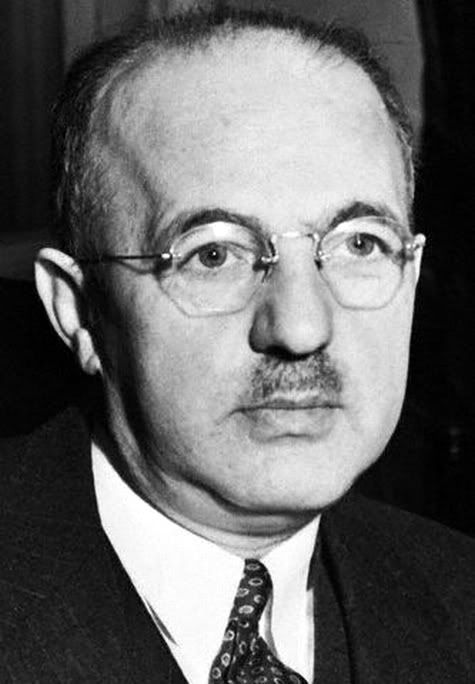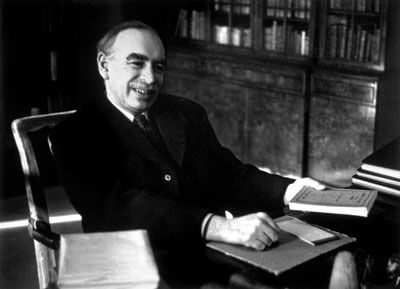Now you tell me
I'm a bit old to be getting disillusioned, but I think I might have been forgiven for having thought that the history of the Vietnam War and the Bretton Woods Accord had been written. Apparently not.
In the latest Foreign Affairs (link), I learn that not only was Bretton Woods a straight-up power-grab by the United States, but that the man doing the grabbing was a Russian mole who envisioned a bipolar world order that did come to pass, although not quite in the way he envisioned. Yes, the world you grew up in was largely the product of the vision of Harry Dexter White, a man who I had literally never heard of until this week. Well, no time like the present to catch up:
- He was a "little-known Treasury official who became the unlikely architect of the Bretton Woods system."
- "Despite never having held any official title of importance, White had by 1944 achieved implausibly broad influence over U.S. foreign policy."
- "White often made himself ill with stress before negotiations with Keynes... But...White outmaneuvered his far more brilliant British counterpart, distinguishing himself as an unrelenting nationalist who could extract every advantage out of the tectonic shift in geopolitical circumstances put in motion by World War II."
- "Even White's closest colleagues were unaware, however, that his postwar vision involved a far more radical reordering...centered on the establishment of a close permanent alliance with the new rising power - the Soviet Union."
- "In the [recently discovered handwritten] essay...White described a postwar world in which the Soviet socialist model of economic organizaiton, although not supplanting the American liberal capitalist one, would be ascendant. 'In every case,' he argues, 'the change will be in the direction of increased [government] control over industry, and increased restrictions on the operations of competition and free enterprise."
- "He believed passionately in the success of the bold Soviet experiment with socialism."
THIS IS THE GUY NEGOTIATING YOUR INTERNATIONAL MONETARY ARRANGEMENTS. Ahem, sorry. To continue...
- "Although the broad "White Plan" for the IMF clearly bore no imprint of Soviet monetary thinking, as there was none to speak of, White was highly solicitous of the obstructionist Soviets at the conference itself..."
BECAUSE...
- "Eager for influence and dismissive of bureaucratic barriers to action, White began the sort of dangerous double life that attracted many of his Washington contemporaries in the 1930s and 1940s."
- "Over the course of 11 years, beginning in the mid-1930s, White acted as a Soviet mole, giving the Soviets secret information and advice on how to negotiate with the Roosevelt administration and advocating for them during internal policy debates. White was arguably more important to Soviet intelligence than Alger Hiss, the U.S. State Department official who was the most famous spy of the early Cold War."
- "According to Whittaker Chambers...White's clandestine work [for the commies] began in 1935..."
- "Yet, unlike Chambers, White would not take orders from Moscow. He worked on his own terms... Working through intermediaries close to him, White secured official Treasury documents for Chambers, which, after Chambers photographed them in his Baltimore workshop, White returned through the same channels. White also prepared weekly or biweekly memos for Chambers summarizing what he considered useful information."
Some, but not all of this was understood in the early 50s, thanks to the Venona decrypts. The U.S. knew there was a mole at Treasury, and by 1946 White was under FBI surveillance. Later that year, J. Edgar Hoover was warning Truman to not put this guy in charge of the IMF (Truman didn't).
You should have promoted me, Mister Truman. Come the revolution...

White died in 1948 after some stressful conversations with Congress.
The fine Wikipedia note on White offers this succinct assessment of the man, and the problems he poses for historians, from Benn Steil:
White almost certainly, and over many years, gave confidential and classified U.S. government information–in original, transcribed, and oral form–to individuals whom he knew would ultimately transmit it to the Soviet government... Yet the economics White advocated were hardly Marxist. They were by this time what would be described as thoroughly Keynesian... As for White’s domestic politics, these were mainstream New Deal progressive, and there is no evidence that he admired communism as a political ideology. It is this chasm between what is known publicly of White’s economic and political views, on the one hand, and his clandestine behavior on behalf of the Soviets, on the other, that accounts for the plethora of unpersuasive profiles of the man that have emerged."Thoroughly Keynesian," eh?
Maybe that old professor wasn't such a chump, after all. What was that thing he said? Oh yeah...
"Practical men, who believe themselves to be quite exempt from any intellectual influence, are usually the slaves of some defunct economist."
Let me write that down for you, Harry

So that was one thing.
The other thing, and I am kind of upset about this, is that it has come to light that the Vietnam War was, in addition to all the other things it was, intentionally genocidal.
Americans have long been taught that events such as the notorious My Lai massacre were isolated incidents in the Vietnam War, carried out by "a few bad apples." But as award‑winning journalist and historian Nick Turse demonstrates in this groundbreaking investigation, violence against Vietnamese noncombatants was not at all exceptional during the conflict. Rather, it was pervasive and systematic, the predictable consequence of orders to "kill anything that moves."
Ok, we admitted it. We're all good here, right?
No. No we are not. Look, I knew it was a dirty war. A friend in Boston fought in it and told me as much. But looking at this, and looking at the civilian body counts in Iraq and Afghanistan (and the accompanying suppression of press coverage), I'm forced to conclude that in my lifetime the United States of America has succumbed to a malignant imperial virus. Which is problem, because our empire is supposed to be based on niceness and goodness.
That's not bullshit. It's real, and it goes way back. George Washington, took prisoners and acted with honor in the face of a superior force, making the American War of Independence one of the least horrific rebellions ever fought. He scored huge propaganda points by drawing an unfavorable comparison between the "cultured" British fondness for bayoneting farmers and the humane behavior of his ragtag army (Mao got similar mileage from this trope).
This was an American tradition (well, usually), noted as late as the Siege of Bastogne by the German commander, who mocked as only evil SS commanders can:
If this proposal should be rejected one German Artillery Corps and six heavy A. A. Battalions are ready to annihilate the U.S.A. troops in and near Bastogne. The order for firing will be given immediately after this two hours term.
All the serious civilian losses caused by this artillery fire would not correspond with the well-known American humanity.And I do think we're the good guys, still. The drone debate is for me a sign of health. Not the sort of thing they'd have a public conversation about at any of our imperial predecessors.
But this Vietnam thing is bugging me. Now that everyone connected with it is dead, except you, Henry, we can tell the truth and admit we were killing everything in sight. The only problem is that I didn't sign up for that. America didn't sign up for that. A tough war in a geopolitical struggle between competing ideologies? Sure. But an extermination operation against innocents, too shameful to deserve even the lowly name of war? No way. I can't get behind that, man.


3 Comments:
Um, please don't take this the wrong way, but is this the first you've heard of the massive civilian casualties in the Vietnam war?
What did I know and when did I know it?
I knew in the 1960s that our policy of not noticing civilians killed by our bombing, carried over from WW2, was intact.
I knew in the 1970s that the U.S. military had engaged in massacres of civilians, notably My Lai, but probably many others. And Operation Speedy Express raised eyebrows (as in this contemporary Newsweek article. But even this account, sympathetic to Vietnamese civilians, suggests that Operation Speedy Express was a single misconceived campaign, not part of a systematic program.
I knew in the 1980s that the U.S. actively supported genocidal anti-insurgency measures in places like Guatemala.
So, yeah, this was the first I'd heard that tens of thousands of non-combatant Vietnamese women and children were intentionally targeted and killed by our ground forces during the Vietnam War.
In 2010 PBS did a refresh on My Lai. Don North, who covered the war for ABC and NBC for five years (I have no idea how reliably), offered this commentary in his review for Vietnam magazine:
It has been fashionable in the past year to publish books suggesting the Vietnam War was one long atrocity committed by American troops. War Without Fronts by Bernd Greiner and The War Behind Me by Deborah Nelson seem to ignore the fact that 3 million Americans fought in Vietnam without committing or covering up atrocities. My Lai cannot compare with the massacre by Communist forces of 2,810 Vietnamese civilians in Hue during Tet 1968.
By contrast, "Turse argues that the intentional killing of civilians was quite common" throughout the war.
So, no, I don't think this was generally accepted as fact, and now that there is a credible historical account of it, based on original sources - forty fucking years later - I don't think it should pass without being noted.
The enormous, horrible lie we were told was even more enormous and horrible than we had previously known.
So, back to Afghanistan and Iraq...
Too bad we didn't win that war because liberals.
Post a Comment
<< Home